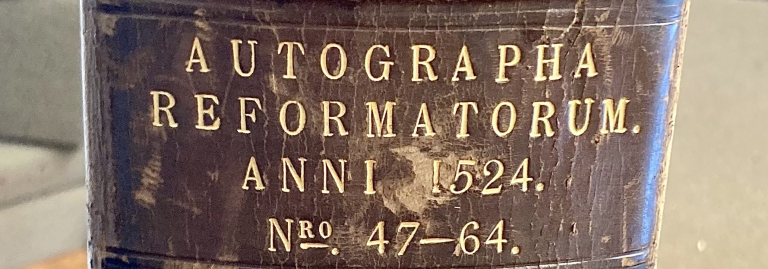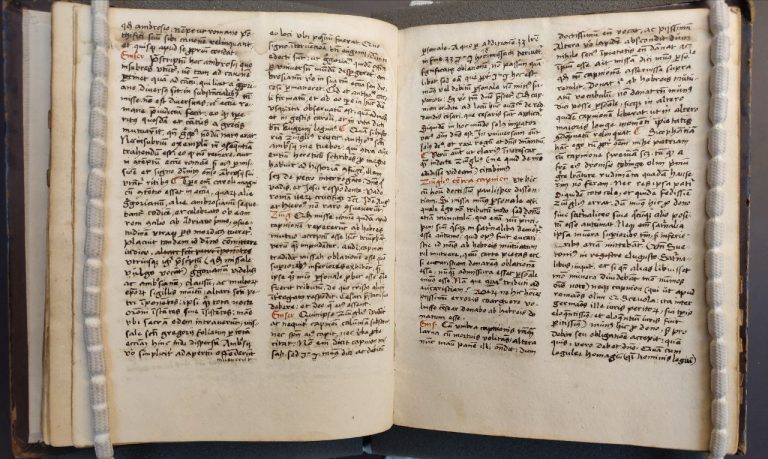00:50 Marie Martine: Opening 04:45 Emily Dicker on creating the visual imagery 07:09 Victoria Mckinley-Smith on the translation process 09:03 Emily Dicker, Victoria Mckinley-Smith, Lia Neill, and Isabella Reese: Reading The launch presented a new bilingual edition of ‘Werde, die du bist !’, a novella by the German feminist essayist and writer, Hedwig Dohm (1831-1919), …
Category: Editions
Emser on Luther’s Bible Translation
Guest blog by Carol Regulski on the launch of her transcription of Hieronymus Emser’s book Auß was grund vnnd vrsach Luthers dolmatschung / vber das nawe testament / dem gemeinē man billich vorbotten worden sey (Leipzig: Wolfgang Stöckel, 1523) https://editions.mml.ox.ac.uk/editions/emser/ My attention was first drawn to Emser’s book in 2009, when Professor David Yeandle at …
History of the book vs the (digital) world
By Matthew McConkey As anyone who has grappled with Single Sign-on can attest, humanities researchers and IT are often uneasy bedfellows. It was this perceived <div>ide that the 2024 history of the book students confronted last Wednesday: just what hides behind the intimidating pseudonyms ‘XML’ and ‘TEI?’ Luckily, we had an expert guide in Emma …
Hans Sachs in Oxford 4: The Edition
By Henrike Lähnemann Preface to the Edition 2024 marks the 500th anniversary of Hans Sachs publishing in quick succession four prose dialogues which became bestsellers, particularly the first one where he has his alter ego, Hans the cobbler, debate a pompous priest – and win the day, of course. That the Taylorian was aware of …
Hans Sachs Edition 3: The Pamphlets in Oxford
By Philip Flacke The Reformation in sixteenth-century Germany was a matter of public debate to a scale that had never been seen before. It was carried by a generation, born between 1470 and 1500, whom Thomas Kaufmann has recently characterised as ‘printing natives’ in analogy to the digital natives of today.1 These women and men …
Hans Sachs in Oxford 2: English Reformation Dialogues
By Jacob Ridley When the nine-year-old Edward VI came to the throne of England in January 1547, the floodgates of English Protestant print opened. His father Henry VIII had declared an independent Church of England in 1534, rejecting the authority of the Pope, but Henry remained theologically conservative and enforced heresy laws against the more …
Hans Sachs in Oxford 1: Historical Context
By Thomas Wood Situated on the river Pegnitz in the heart of the Holy Roman Empire, the Nuremberg of Hans Sachs was a thriving Free City that acted in 1524 as a site of both Imperial power and religious conflict. In the late Middle Ages and into the sixteenth century, Nuremberg had been a prosperous …
Hans Sachs in Oxford
On the 500th anniversary of their first publication, the first of the four hilarious, successful and witty Reformation Dialogues by Hans Sachs is reissued in a new edition. This includes a new English translation, a historical introduction, linguistic footnotes, and also the 15th century Dutch and English translations. The launch event comes in three parts, …
Whose hand? Unearthing an Unknown Manuscript in the Bodleian
The discovery of an unknown Bodleian manuscript of Hieronymus Emser’s defence against Huldrych Zwingli’s 1524 tract opposing the Catholic Mass, which celebrates its quincentenary this year, raises many questions: Who penned or commissioned it, for whom, why, and where did it come from?
Taking Editorial Decisions for a Collection of Early Modern Villancicos
By the end of Michaelmas term, I came across a volume at the Weston Library on which several villancico chapbooks were bound. The volume itself had no title, no index, no author. There was nothing that could point to its origin but a shelfmark – Arch. Sigma III 70 – belonging to an enigmatic collection. …







